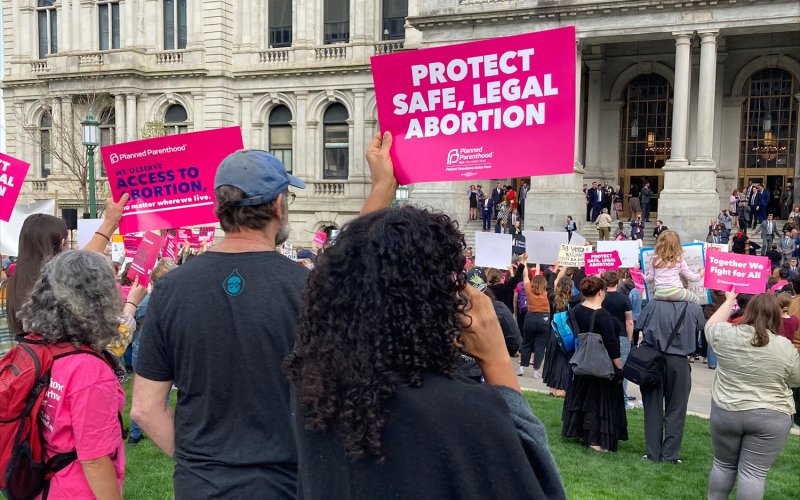WGSS Statement in Response to the Majority Opinion Draft from the U.S. Supreme Court on ROE V. WADE

In response to the May 3rd, 2022 leaked draft majority opinion from the U.S. Supreme Court on Roe v. Wade, the Department of Women’s, Gender and Sexuality Studies (WGSS) at the University at Albany, State University of New York, affirms the right for women and all people with the capacity to become pregnant to have access to safe and legal abortions. We acknowledge that this is a basic right, which is part of the full reproductive freedoms under the rubric of “reproductive justice,” defined by the women-of-color-led SisterSong Collective as “the human right to maintain personal bodily autonomy, have children, not have children, and parent the children we have in safe and sustainable communities.” We affirm these comprehensive rights alongside the right to gender-affirming healthcare for trans and non-binary individuals, as well as to equitable healthcare across races, ethnicities, nationalities, sexualities, and (dis)ability or immigration status.
As a department at a state university within the Capital Region of New York, we affirm the right to legal abortions on the state level and maintain solidarity with grassroots activists, advocates, and providers in other states struggling against abortion restrictions and outright bans. Within these United States, we also acknowledge that we reside on Indigenous lands, specifically of the Mohican, Haudenosaunee or Iroquois, and Schaghticoke communities in the Capital Region, the first nations to feel the full brunt of reproductive control and oppression by the state. Reproductive control against Indigenous people manifested in settler colonialism, genocidal missions, stolen children and forced assimilation through boarding schools and other re-education camps.
In cultivating stolen Indigenous lands, other reproductive controls included the expansion of enslaved labor among African-descended people stemming from the system of chattel slavery, which relied on forced pregnancies among the enslaved in the wake of the transatlantic slave trade ban in 1808, only twenty years after the founding of the U.S. Constitution and nearly sixty years before the legal abolition of slavery in 1865. We recognize these histories of oppression intersect across gender, race, and class: from the control of Indigenous and African-descended bodies—including forced sterilizations and forced pregnancies—to medical experimentations on enslaved women, thus leading to the development of biomedicine in gynecology and obstetrics, which in turn relied on the dismissal of midwifery and women’s medical knowledge and the push for control over cis-women’s bodies through anti-abortion laws that intertwined with anti-Black racism via legalized Jim Crow segregation—constituted with the Supreme Court decision of Plessy v. Ferguson (1896)—and anti-immigration sentiments reflected in such acts as the 1875 Page Act, which banned Chinese women from the United States, a precursor to the 1882 Chinese Immigration ban.
The ideologies of these systemic oppressions extended globally to totalitarian regimes such as Nazi Germany, which practiced forced sterilization of “undesirables” and the forced impregnation of the “racially pure.” Even with the fall of this regime, other totalitarian governments have expanded the use of the state to enforce reproductive control, whether in Romania’s complete ban on abortions and contraceptives during the mid-twentieth century—resulting in increased infant and maternal mortality rates—or in China’s disastrous one-child policy in the late twentieth century that led to state-imposed birth control and abortions that skewed population sex ratios at birth.
Within democracies such as the United States, reproductive control included laws banning safe and legal abortions until the Supreme Court decision of Roe v. Wade (1973), forced sterilization of Indigenous, African American, and disabled women across races and socioeconomic backgrounds, and medical experiments on low-income women of color on the U.S.-occupied Caribbean island of Puerto Rico, from where birth control pills and other contraceptives were developed. These national and foreign policies—often asserting the threat of “racial others” and the need for “population control”—blended racial politics with gender politics. Therefore, our affirmation of reproductive rights and freedoms also requires our condemnation of the intersecting oppressions of (hetero)sexism, racism, classism, nationalism, settler colonialism, and imperialism.
As an interdisciplinary field, WGSS integrates studies in history, sociology, political science, literature, the arts and other disciplines to reveal these complex machinations over time and across societal dimensions at the intersections of gender, race, class, nationality, sexuality, and other vectors of difference. Extending our analyses of intersectionality, first coined by Black feminist legal scholar Kimberlé Crenshaw, we employ transnational perspectives to develop solidarity across geopolitical borders with feminists around the world who advance reproductive rights among other gender-based issues, many of whom have been successful in recent years in extending the right to safe and legal abortions in such countries as Mexico, Argentina, and Ireland.
As an interdisciplinary department founded on feminist principles, we commit to providing social-justice education that reveals the histories, legalities, literatures, social movements, and media depictions of gender-based issues and to educating across the diversity of genders, races, classes, sexual orientations, nationalities, ages, and (dis)abilities. We also promote respect for the diversity of experiences, perspectives, and ideas with the goal of uplifting the most marginalized among us and challenging oppressive ideas and beliefs that perpetuate systemic inequalities. We commit to a politically and socially functional democracy that recognizes individual, communal, and societal freedoms, which must include reproductive freedoms as a fundamental principle on which to build “justice for all.”


